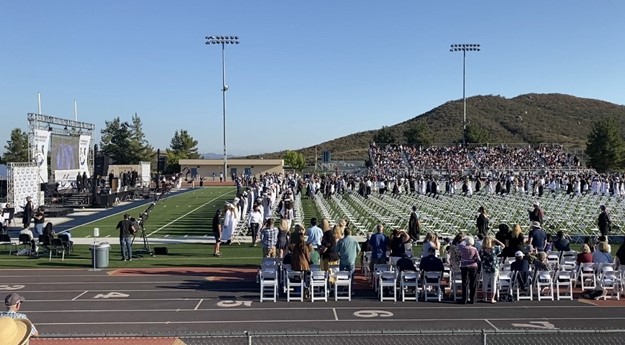The morning of her high school graduation in June 2020, Ronnie Bar didn’t rush to a salon or slip on a cap and gown.
The world was shut down. The pandemic had erased every plan.
Instead, she sat in her living room wearing pajama pants and a wrinkled senior sweatshirt, watching her graduation livestream on YouTube.
“I didn’t hear my name called,” Bar said. “I didn’t hug anyone. I just watched the screen and thought, ‘So … that’s it?’ It felt like pressing play on someone else’s ending.”
Students from the high school classes of 2020 and 2021 are finally approaching another major milestone: college graduation. But the absence of a proper send-off from high school still lingers.
COVID-19 stole a long-awaited moment and for many, it left emotional echoes that continue today.
Across the country, rites of passage like prom, grad night and senior trips were canceled overnight. According to the National Center for Education Statistics, more than 85% of U.S. high schools either canceled or significantly altered their graduation ceremonies in 2020.
That disruption wasn’t just logistical, it was personal.
“My grandma bought a cake and cried in the kitchen,” said Lance Kersey, a senior at UC Riverside who was the first in his family to graduate high school.
“That was our celebration. It wasn’t what I pictured growing up.”
Experts say those missed rituals are more than just disappointing, they’re developmentally significant.
“Adolescence is full of what psychologists call ‘developmental markers,’ Patrice Harris said, a clinical psychologist who works with teens and young adults.
“Graduation represents closure, identity and transition. When those are removed, many young people experience a kind of emotional limbo.”
Even administrators witnessed the emotional impact.
“We did our best to make graduation feel special, but nothing could replace the collective joy of a traditional ceremony,” Mrs. Scalion said, principal of Vista Murrieta High School.
“Watching students walk across a stage, outside, with masks covering their face, sitting six feet apart was heartbreaking. We knew they deserved more.”
According to the Centers for Disease Control and Prevention’s 2023 Youth Risk Behavior Survey, more than 42% of high school students reported persistent feelings of sadness or hopelessness during the pandemic. A significant increase from previous years. Pew Research Center findings also show that members of Generation Z continue to report higher levels of anxiety and social disconnection than any other age group.
Still, the experiences of Bar and Kersey reflect both loss and growth. Bar, now active in student government at her school, advocates for increased campus mental health support.
“We were forced to adapt,” Bar said. “That’s a strength we carry with us now.”
Kersey mentor’s first-generation students and views his non-traditional graduation as a defining moment.
“I didn’t get to throw my cap in the air, but it taught me to find meaning in smaller moments,” he said.
Bar still has the YouTube link of her graduation saved in her bookmarks.
“I haven’t watched it since,” she said. “But maybe I will someday. I think I just needed to live a little first.”


